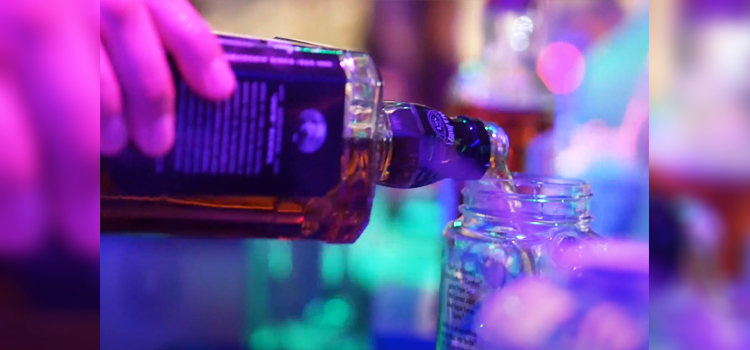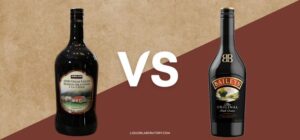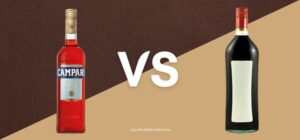Last Updated on March 23, 2024 by Lydia Martin
Liquor is often called “Spirits,” but ever wonder why? The origin of the word “Spirit,” referring to alcoholic drinks, is just one interesting history of alcohol.
So to answer why is alcohol called spirits, keep reading as this article will take you back to history to learn the definition and development of this intriguing topic.
Table of Contents
ToggleWhy Alcohol Is Often Referred As Spirits

Quick throwback: From the Latin words “Spiritus” and “Spirare,” spirits means “breath,” which involves wind and respiration. During the Middle Ages, it was eventually used to refer to the divine and supernatural.
Liquor is distilled employing heating a base alcoholic liquid or mash that undergoes a fermentation process, like fermented wine, extracting the alcohol from the liquid.
Then the fermented liquid will undergo a distillation process to capture the essence or spirit of the distilled liquor, which the word “alcohol” means in alcoholic beverages.
But if we refer to the Oxford English Dictionary, the earliest record of the term “spirit” really meant a “liquid” —not pertaining to liquor.
Not until the 16th century that there were records using “spirit” to refer to or describe an “intoxicating alcoholic drink.”
Reasons Why It Is Called A Spirit
Aristotle Claims So
Any alcoholic beverages [1] referred to as “spirits” started when Aristotle claims so, based on the “BarSmarts Advanced” handbook written by authors and alcohol connoisseurs Paul Pacult, Dale DeGrodd, and David Wondrich.
According to the book, Aristotle narrate the distillation of spirits as early as 327 BC.
But there’s very little evidence supporting the distilled spirits’ existence in Ancient Greece at that time.
In one passage of the book, Aristotle referred to “alcohol” as “spirits,” thinking when someone is drinking alcohol or liquor, they’ve left with an invigorated “spirit.”
Middle East Alchemists Gathered “Spirit” Upon Distillation

The first successful distillation was performed in the Middle East by alchemists, a group of skilled artisans.
While they’re known for searching for gold, some attempt to do mixed drinks for medicinal purposes.
But to make the meds more effective and potent, they mix liquid, distill it, then collect the vapor. They will enhance the “spirit” of their original mixture.
Throughout history, the first distillation process for making alcohol was carried out by a monk known as Roman Llull.
His journals were analyzed, and it was revealed that he was the first to record the formulas for loosening the alcohol content of grape wine.
As base alcohol, liquor undergoes a distillation process wherein the water is removed.
This process increases the concentration of alcohol, condensed once the various techniques are completed.
It’s Biblical
For those familiar with the verse from Acts 2:13 (in the New Testament), the author referred to the Holy Spirit as tongues, doves, fire, water, and wind.
It is interpreted as referring to the bystanders’ reactions to the effects of the Holy Spirit as if they were intoxicated by the good wine drink they had consumed.
Alcohol’s Etymology
There are claims that the term “alcohol” comes from two words from the Arabic language. So what are these terms?
Al-Koh’l
One interesting fact about alcohol’s etymology is its link to the ancient “eyeliner.”
This may seem like a joke, but seriously, eyeliner before was made using a powdery substance called “stibnite.”
It’s a black mineral, a main ingredient of ancient eyeliners, referred to as “Al-Koh’l,” which means “to paint” in the Arab language.
This product was created using a process known as sublimation, similar to the distillation we know today.
This term became a more generalized term for any type of distilled substance.
During the later periods of history, the term “alcohol” was often attached to the liquid containing “ethanol.”
The spirit of the substance was then released throughout the distillation process.
Al-Ghawl
“Al-Ghawl” means “spirit” in the Arab language. Based on their Qur’an, verse 37:47, the term refers to a demon producing a sense of intoxication.
Etymology Of The Term “Spirits” & What It Really Means

Actually, there’s no accurate information on the etymology of the term “spirits.”
In regards to its meaning, there are several meanings behind it.
Based on the Oxford dictionary, “spirits” can be a human soul, holy spirit, alcohol, attitude, determination/courage, and mind/character/feelings.
But nowadays, a wide range of alcoholic drinks, such as gin, whiskey, rum, tequila, vodka, and brandy, are referred to as “spirits.”
What’s The Difference Between The Two?
The word “spirit” and the term “liquor” are often interchangeably used to refer to any alcoholic beverage that has been strongly distilled.
“To alcohol! The cause of… and solution to… all of life’s problems.”
— Matthew Abram Groening, American Cartoonist/Writer/Producer/Animator
But, in some cases, some people use the term “liquor” to refer to distilled alcohol [2] that is not aged, such as gin, vodka, and tequila (silver or blanco).
What Liquors Are Considered Spirits?

The liquors considered spirits are the ones distilled to produce alcohol.
Although liquor can be found in various types and flavors, all of it starts as a mash that undergoes the fermentation process and distillation.
The distillation of the blends creates a high alcohol concentration. Also, some are aged in oak barrels, like whiskey, to enhance the flavors and colors of the final product.
But aside from that, what liquors are considered spirits?
- Due to distillation, hard alcohol contains a large amount of alcohol. The alcohol content is classified into various types and gets its proof by doubling its ABV.
- Rum is considered liquor and one of the spirits. Rum is made from fermented sugarcane, usually soaked in oak barrels.
- Gin is created by distilling grain, then adding botanicals like citrus zest, coriander, and juniper berries.
- Another spirit is tequila, made from pure blue agave plants and produced in Mexico. Its smooth and mellow taste comes from aging in oak barrels.
- Brandy is also considered one of the spirits, distilled from fruit juice or wine, then aged in oak barrels.
Frequently Asked Questions (FAQs)
Why is alcohol known as spirits?
The term “spirits” in the context of alcoholic beverages originated from the Latin word “spiritus,” which means “breath” or “spirit.”
Historically, the distillation process used to produce strong alcoholic beverages was believed to extract the spirit or essence of the base ingredients, resulting in potent and flavorful liquids.
Over time, the term “spirits” became associated with distilled alcoholic beverages, particularly those with higher alcohol content.
Unlike fermented beverages like beer and wine, which are produced through fermentation alone, spirits undergo a distillation process that concentrates the alcohol content, creating a more potent and flavorful drink.
Today, the term “spirits” is commonly used to refer to a broad category of distilled alcoholic beverages, including vodka, gin, rum, whiskey, and others.
What are the 7 spirits of alcohol?
The term “spirits” is often used as a broad category encompassing various types of distilled alcoholic beverages. While there isn’t a specific list of “7 spirits of alcohol,” some common types of spirits include:
Vodka: A neutral spirit typically made from grains or potatoes and distilled to a high level of purity.
Gin: A flavored spirit made by distilling grain alcohol with botanicals, most notably juniper berries.
Rum: A spirit made from fermented sugarcane juice or molasses, often associated with tropical regions.
Whiskey: A distilled spirit made from fermented grains such as barley, corn, rye, or wheat and aged in wooden barrels.
Tequila: A spirit made from the blue agave plant, primarily produced in Mexico.
Brandy: A spirit made by distilling wine or fermented fruit juice, commonly associated with grapes, apples, or pears.
Liqueurs: Sweetened spirits flavored with various ingredients such as fruits, herbs, spices, or nuts, often used as cocktail ingredients or enjoyed on their own.
This list is not exhaustive, and there are many other types and varieties of spirits produced worldwide, each with its own unique characteristics and production methods.
Is wine considered spirits?
No, wine is not considered a spirit. Wine is a fermented alcoholic beverage made from grapes or other fruits, where the sugar in the fruit is converted into alcohol by yeast during the fermentation process.
Unlike spirits, wine does not undergo distillation to increase its alcohol content. Instead, the alcohol content in wine typically ranges from around 8% to 15% by volume, depending on factors such as grape variety, fermentation technique, and aging process.
Wine is typically categorized into different types such as red wine, white wine, rosé, sparkling wine, and fortified wine, each with its own distinct characteristics and flavor profiles.
While both wine and spirits are alcoholic beverages, they are produced using different methods and serve different purposes in the world of drinks and cuisine.
When did the word spirit originate?
The word “spirit” in the context of alcoholic beverages originates from the Latin word “spiritus,” which means “breath” or “spirit.” The use of the term to refer to distilled alcoholic beverages likely emerged during the Middle Ages or early modern period when the process of distillation became more widespread in Europe. By distilling fermented liquids, such as wine or beer, early alchemists and distillers believed they were capturing the essence or spirit of the base ingredients, resulting in potent and flavorful liquids.
Over time, the term “spirit” became associated with these distilled alcoholic beverages, distinguishing them from fermented beverages like beer and wine.
Is alcohol also called spirit?
Yes, alcohol is often referred to as “spirit” in the context of distilled alcoholic beverages. The term “spirit” is commonly used as a broad category encompassing various types of distilled alcoholic beverages, including vodka, gin, rum, whiskey, tequila, and others.
Unlike fermented beverages like beer and wine, which are produced through fermentation alone, spirits undergo a distillation process that concentrates the alcohol content, creating a more potent and flavorful drink.
Therefore, alcohol is indeed called “spirit” when referring to distilled alcoholic beverages.
Is a liquor a spirit?
Yes, liquor is a term often used interchangeably with “spirit” to refer to distilled alcoholic beverages. Both terms broadly encompass a wide range of distilled alcoholic beverages, including vodka, gin, rum, whiskey, tequila, brandy, and others.
Liquor is typically characterized by its higher alcohol content compared to fermented beverages like beer and wine, resulting from the distillation process.
While there may be regional or cultural variations in the use of these terms, they generally refer to the same category of alcoholic beverages. Therefore, a liquor is indeed considered a type of spirit.
What’s the difference between alcohol and spirits?
The term “alcohol” is a broad category that encompasses a wide range of organic compounds characterized by the presence of a hydroxyl (-OH) group attached to a carbon atom. In the context of beverages, “alcohol” typically refers to ethyl alcohol or ethanol, the type of alcohol that is commonly consumed in alcoholic beverages.
Ethanol is produced through the fermentation of sugars by yeast, resulting in the conversion of sugars into alcohol and carbon dioxide.
“Spirits,” on the other hand, specifically refer to distilled alcoholic beverages. Distillation is a process that involves heating a liquid mixture to create vapor and then condensing that vapor back into a liquid.
This process effectively separates the alcohol from other components of the mixture, resulting in a more concentrated and potent alcoholic beverage.
In summary, while “alcohol” is a broad term that refers to a class of organic compounds, “spirits” specifically denote distilled alcoholic beverages.
What type of alcohol is a spirit?
Spirits, as mentioned earlier, are distilled alcoholic beverages. They are typically produced through the distillation of fermented liquids such as grains, fruits, or sugarcane.
The primary type of alcohol found in spirits is ethanol or ethyl alcohol, the same type of alcohol present in beer, wine, and other alcoholic beverages.
However, in spirits, ethanol is present in a more concentrated form due to the distillation process, resulting in higher alcohol content compared to fermented beverages.
Is soju a spirit?
Yes, soju is considered a type of spirit. Soju is a clear, colorless distilled alcoholic beverage that originated in Korea. It is traditionally made from grains such as rice, wheat, or barley, although modern variations may use other starches such as sweet potatoes or tapioca.
Soju typically has a relatively high alcohol content, ranging from about 16% to 25% alcohol by volume (ABV), although some varieties may have higher or lower alcohol content.
Like other spirits, soju undergoes a distillation process that separates the alcohol from the base ingredients, resulting in a more concentrated and potent beverage.
Soju is commonly enjoyed neat or as a base for cocktails and mixed drinks, and it holds cultural significance in Korean cuisine and social gatherings. Therefore, soju fits the definition of a spirit as a distilled alcoholic beverage.
How are spirits classified?
Spirits are classified based on various factors, including their primary ingredients, production methods, and aging processes. Some common classifications of spirits include:
By Base Ingredient: Spirits can be classified based on the primary ingredient from which they are made. For example, whiskey is made primarily from fermented grains, such as barley, corn, rye, or wheat, while rum is made from sugarcane or molasses, and tequila is made from the blue agave plant.
By Distillation Process: Spirits can also be classified based on the distillation process used to produce them. This includes pot-distilled spirits, which are typically distilled in copper pot stills, and column-distilled spirits, which are distilled in continuous column stills. The type of still used can influence the flavor and character of the final spirit.
By Aging: Many spirits are aged in wooden barrels or casks, which can impart additional flavors and complexity to the spirit. Spirits such as whiskey, brandy, and some types of rum are often aged for varying periods to develop their unique characteristics.
By Origin: Some spirits are classified based on their geographical origin or production methods. For example, cognac and Armagnac are types of brandy that must be produced in specific regions of France according to strict regulations.
These classifications can help consumers and producers better understand and appreciate the wide variety of spirits available in the market.
Are spirits pure alcohol?
Spirits are not pure alcohol. While spirits have a higher alcohol content compared to other alcoholic beverages like beer and wine, they are not 100% alcohol (ethanol).
The alcohol content of spirits typically ranges from around 40% to 60% alcohol by volume (ABV), depending on the specific type of spirit and the distillation process used. The remaining portion of the spirit consists of water and other compounds derived from the base ingredients and the distillation process.
These compounds contribute to the flavor, aroma, and mouthfeel of the spirit, making each type of spirit unique.
Is Hennessy a spirit?
Yes, Hennessy is a type of spirit. Specifically, Hennessy is a brand of cognac, which is a type of brandy produced in the Cognac region of France.
Cognac is made from distilled wine, primarily from grapes grown in the Cognac region, and is aged in oak barrels for varying periods to develop its distinctive flavor and character.
Hennessy is one of the most well-known and prestigious brands of cognac globally, offering a range of products from entry-level to ultra-premium expressions.
Therefore, Hennessy fits the definition of a spirit as a distilled alcoholic beverage.
What is the true meaning of spirit?
The term “spirit” has multiple meanings depending on the context in which it is used. In a general sense, “spirit” can refer to a non-physical entity or essence, often associated with qualities such as consciousness, vitality, or character. It can also denote a person’s mood, attitude, or disposition, as in phrases like “high spirits” or “good spirits.”
In a religious or metaphysical context, “spirit” often refers to a divine or supernatural entity, such as the Holy Spirit in Christian theology or the spirits believed to inhabit the natural world in animistic belief systems.
In the context of alcoholic beverages, “spirit” refers to distilled alcoholic beverages with a high alcohol content, such as whiskey, rum, vodka, gin, and others. The term likely originated from the Latin word “spiritus,” meaning “breath” or “spirit,” reflecting the belief that the distillation process captured the essence or spirit of the base ingredients.
Overall, the meaning of “spirit” can vary depending on the context, ranging from non-physical entities to distilled alcoholic beverages.
So, Why is Alcohol Called Spirits?
While there are many theories about where the word “spirits” came from, and there are many meanings behind it, one thing is certain—alcohol and spirits have a close relationship with each other, even centuries ago.
Regardless of its origin and history, what’s important is what it meant to us and how we and others understand its meaning.
References:
















